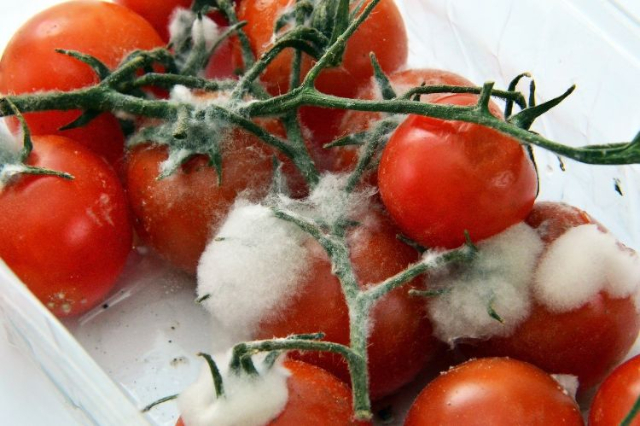An interesting question is being asked in food news circles. It’s kind of a spinoff from yesterday’s story about more Canadians eating foods past their Best Before date. And it focuses on eating food that’s ‘too old’…
 These tomatoes are clearly spoiled, and unsafe to eat.
These tomatoes are clearly spoiled, and unsafe to eat.
We reported yesterday, that a survey showed more folks are eating foods past their Best Before dates. But a follow-up question also uncovered a potentially troubling health risk. The poll, commissioned by the Agrifood Analytics Lab (AFAL) at Dalhousie University, also revealed more Canadians are eating expired and potentially dangerous foods.
All in the name of saving money on groceries.
Best Before vs. Expired
Let’s take a moment to reprise the difference between Best Before and Expiry dates. It’s a crucial distinction that could mean the difference between a sati9sfying supper and a trip to the emergency room.
Best Before dates are an indication of the point in a product’s life when its’ appearance, flavour or texture may suffer from aging. In a nutshell, it’s a matter of attractiveness, not wholesomeness. You can still eat the food but you might not enjoy it as much as you would if you’d eaten it sooner.
Expiry dates are strictly a matter of wholesomeness. They indicate when a food can be considered too old to eat safely.
The problem is, many folks still confuse the two. It doesn’t present a danger when you throw out a product after its Best Before date, thinking it’s expired. But it can be a serious problem if you chose to eat a product that’s passed its Expiry Date.
One confounding issue…
Many food products don’t display an Expiry date. Just a Best Before date. Consumers are therefore left to decide when a product that’s past its Best Before point is no longer safe to eat. If it’s moldy, decomposed or smells ‘off’, it’s almost certainly unsafe to eat. But the indications are not always that clear.
Survey says…
The survey asked folks if they had every become ill after eating a food product after its Best Before date. The results were both enlightening and shocking. Many more young adults than kids or Boomers answered ‘Yes’:
- Generation Z: 10 percent
- Millennials, born 1980 to 1996: 41 percent
- Generation X, born 1965 to 1980: 24 percent
- Baby Boomers, born 1946 to 1964: 20 percent
- Canadians born before 1946: 10 percent
“The findings reveal 58 per cent are more enticed to eat food that would have the Best Before date either on that day or after,” Said AFAL Director Pro. Sylvain Charlebois.
Cherry Claxton, COO of the Souls Harbour Rescue Mission in Halifax, says many folks she sees every day are making dangerous decisions. “If their option is to eat a can of beans that expired four years ago, or to have two dollars to go buy a new one, it’s not an option for them.”
My take
“If you get sick, it is going to cost you way more than that cabbage you didn’t throw out,” Charlebois observes. Not only in money, but in physical and emotional stress.
It behooves us all to be aware of the signs that a food product has gone past its ‘safe’ point. I can confidently recommend the official US FDA definition. Its Food Spoilage site includes links to a number of articles on specific spoilage issues…
~ Maggie J.

